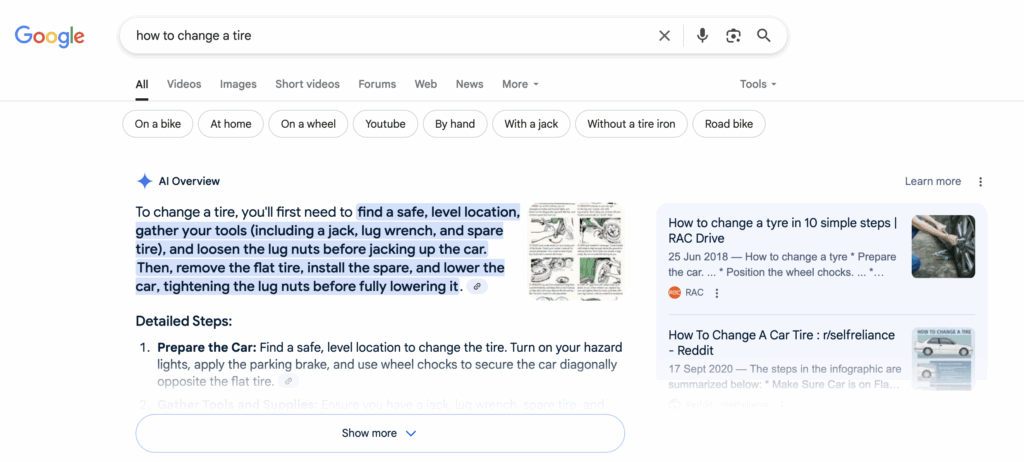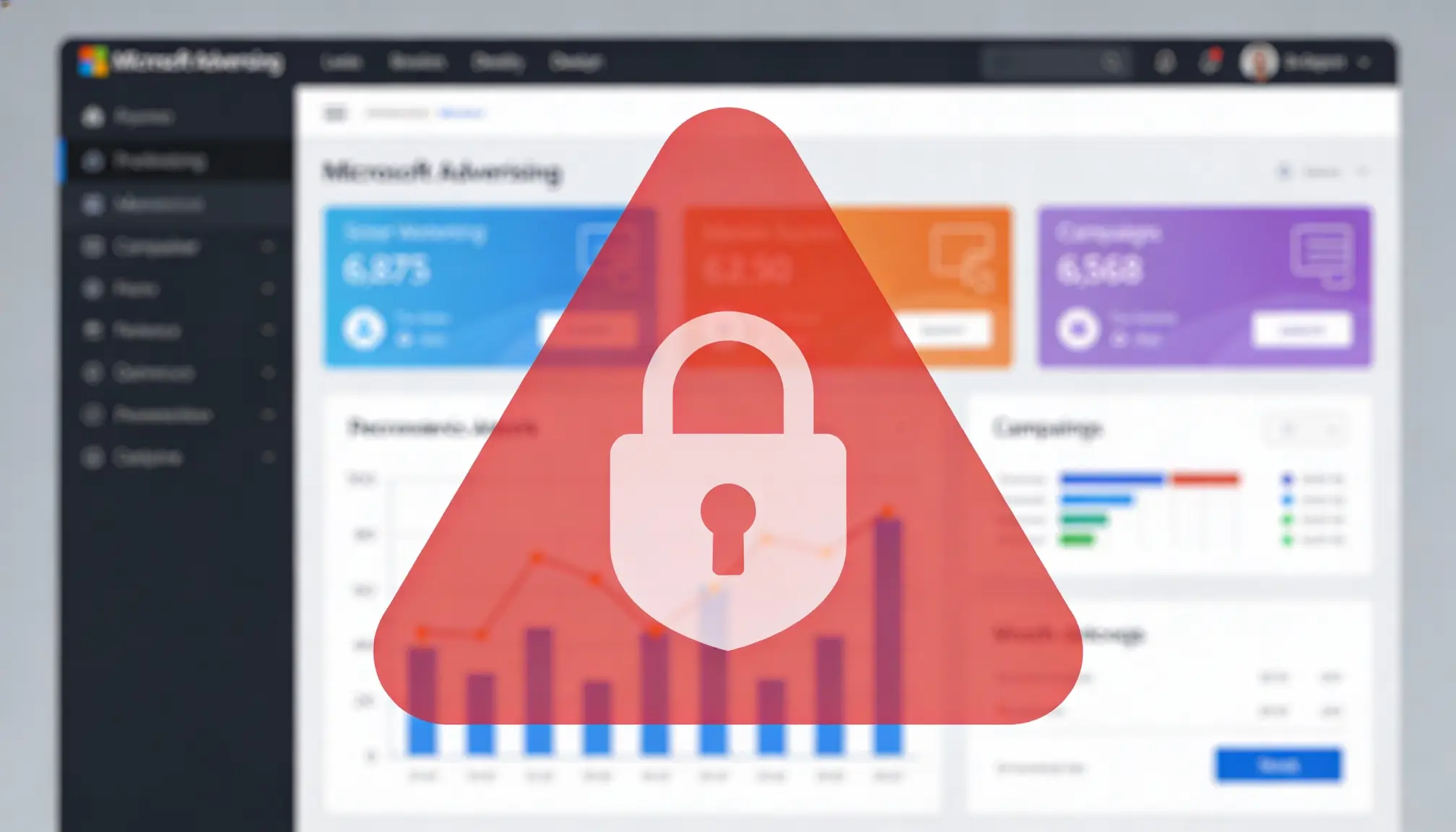Remember when SEO was all about cramming as many keywords as possible into your content? Those days feel ancient now.
The SEO world has gone through a mind-blowing transformation over the last decade, and in 2025, we’re seeing probably the biggest shift yet: AI completely taking over how search engines understand and spit out information.
If you’re feeling overwhelmed by all this, you’re not alone. It’s like showing up to play checkers and suddenly everyone’s playing chess!
But hey, here’s the good news–understanding this doesn’t have to be complicated. Think of this article as your guide to navigating SEO in the AI takeover.
We’ll walk through how we got to this point, what’s happening right now, and most importantly, what you can actually do to make sure your website doesn’t disappear when someone asks Google, Bing, or their smart speaker a question.
By the time you finish reading, you’ll understand why AI is reshaping search results, what the big players are doing about it, and the practical steps to adapt your SEO strategy for this new landscape.
Let’s dive in!
How AI in SEO Transformed Google from Ten Blue Links to AI-Powered Answers
Remember the “good ole days” when you’d search for something and get a clean list of ten blue links? That’s disappearing fast.
Google’s search has evolved from just pointing to websites into your know-it-all friend who answers your questions directly—and that friend is powered by AI.
But don’t think traditional search results are dead. They still drive organic traffic!
Google’s Search Generative Experience (SGE), rebranded as AI Overview, is the biggest change to search results in decades. Instead of just showing links, Google now often gives you an AI-generated summary right at the top.
Look at this real example: Search “how to change a tire,” and instead of just links to guides or videos, you get an AI-generated overview combining the most important steps, troubleshooting tips, and key info—all before you even click a single thing.
The traditional links still appear below, but they’re getting less attention. In fact, data shows that SGE implementation has cut traditional organic click-through rates by as much as 70% for these informational queries.
Introduction to Google’s Transformation
Google has gone through massive transformations over the years, adapting to the changing SEO and digital marketing landscape. With AI integration in its search algorithms, Google is changing how businesses must approach their online presence.
AI-powered SEO tools aren’t optional anymore–they’re essential for optimizing rankings and providing insights that drive investment attraction strategies.
By using AI for keyword research and understanding SEO trends, businesses can target potential investors more accurately and craft messages that actually resonate with their needs, instead of the same old messaging and marketing.
History of Google Search
Google started in 1998 when Larry Page and Sergey Brin founded it. At first, Google just crawled and indexed web pages, giving users relevant search results.
Over the years, Google evolved, adding features like keyword research, search marketing, and technical SEO. Today, Google dominates search, processing over 5.9 million searches per minute, 354 million searches per hour, 8.5 billion searches per day, and 3 trillion searches annually.
Google’s transformation has been driven by AI advancements, letting businesses optimize their online presence and improve search visibility. Did you think they’d still be using the same algorithms from 2010? No way!
The New Kids on the Block: The Competitive AI Search Landscape
Google isn’t the only one revolutionizing search with AI. Everyone’s trying to outdo each other with the latest AI tech.
Microsoft’s Bing has actually made impressive moves with their AI integration. Their AI-powered answers now show up alongside traditional results, and people have noticed. Since implementing these features in late 2023, Bing’s market share increased to 3.9%–not easy in a Google-dominated world.
This shift shows how search marketing, covering both SEO and PPC, is crucial for leveraging AI to improve search results.
OpenAI’s ChatGPT—and now SearchGPT—was first on the scene, taking a different approach by focusing on comprehensive answers instead of traditional ranking factors. While still developing, it’s showing how AI interprets content differently than traditional search algorithms.
And let’s not forget Apple. With Apple Intelligence in Safari, they’re changing how iOS users find information. Morgan Stanley found that a whopping 80% of iPhone users have downloaded Apple Intelligence. That’s a big chunk of mobile searches shifting to a new paradigm.
How Search Behavior Is Changing in Response
All these AI advancements are changing not just how search engines work, but how people use them by focusing on user intent. Here are three major trends we’re seeing:
- Zero-click searches are becoming the norm. People get their answers right in the search results without clicking through to websites. SparkToro’s analysis shows zero-click searches now represent 58.5% of all searches. This means your content needs to be structured to appear in these AI summaries.
- Voice search is everywhere. “Hey Google, how do I fix a leaky faucet?” Sound familiar? In the US right now 13.6% of the population are using smart speakers to buy products, and 38.8 million people is nothing to sneeze at. These voice queries are typically longer and more conversational than typed searches, which means you need to adjust your content strategy.
- Visual search is growing fast. Tools like Google Lens are changing how people shop and discover information. Take a picture of a product, plant, or landmark, and search engines identify it and provide relevant information. Visual searches continue to increase year over year and is something you shouldn’t ignore.
The key takeaway? Search isn’t just about keywords anymore. It’s about understanding questions, providing direct answers, and creating content that AI systems can easily interpret and present to users.
Think of it this way: In the past, SEO was like putting up the best billboard. Now, it’s more like having a helpful conversation with a customer who might not even visit your store. The businesses that adapt to this new reality will be the ones that thrive in the AI-driven search landscape.
How to Make SEO Work For Your Business
Good SEO today isn’t just about keywords or backlinks. It’s about knowing what’s working now—and what will work tomorrow.
AI-powered tools help you:
-
Run real-time site audits
-
Spot technical SEO gaps before they hurt your traffic
-
Benchmark your content against competitors
-
Adapt fast when algorithms shift (because they always do)
The brands that are winning aren’t the ones spending the most—they’re the ones moving the fastest with the right tools. So if your competition is already doing this and you’re still debating it, the gap is only getting wider.
1. Keyword Research and Optimization for AI-Driven Search
Here’s the truth: most keyword strategies are still stuck in the past. AI helps you get beyond volume metrics and start uncovering real opportunities—keywords with intent, context, and high conversion potential.
AI tools scan search behavior in real time. They identify long-tail queries, analyze user intent, and show you what’s missing from your content. This means your content isn’t just visible—it’s valuable.
No more guesswork. No more writing to please algorithms instead of people. Just smarter, sharper targeting that speaks directly to your audience.
2. Content Optimization for AI-Generated Search Experiences
Gone are the days when simply including your target keyword a certain number of times would guarantee visibility. Today’s AI search engines look for content that actually answers users’ questions–and they’re getting pretty good at distinguishing helpful, relevant content from fluff.
According to recent findings from SEO industry leaders, content structured in a clear question-answer format tends to perform better in AI-generated summaries. Think about it like talking to your neighbor–they ask a question, and you give a straightforward, helpful answer without the extras.
For example, instead of writing a paragraph about “affordable lawn care services,” structure it as “How much do lawn care services cost?” followed by a clear, comprehensive answer. This format makes it easier for AI to extract and present your information in search results.
3. Technical SEO Adaptations
While content quality remains king, technical SEO has evolved to help AI systems better understand your content. Implementing structured data, or schema, enhances search engines’ understanding of website content and improves its visibility in search results, emphasizing its importance alongside other technical elements such as site architecture and user experience.
In our experience working with clients across multiple industries, websites with comprehensive schema implementation consistently achieve better visibility in rich results and AI-powered search features. Particularly valuable are FAQ schema, HowTo schema, and Product schema, which help AI engines quickly identify and extract key information from your pages.
As an article from Profound points out, there’s currently a fascinating gap between how ChatGPT and Google interpret information. While Google still relies heavily on traditional ranking signals, AI systems like ChatGPT focus more on the actual content substance.
This creates an opportunity for businesses that can optimize for both approaches–using technical SEO elements that Google values while creating content with the depth and structure that AI systems prefer. It’s not either/or–it’s BOTH!
4. Balancing Technical SEO with Human-Centric Content
The most successful websites in 2025 are those that find the sweet spot between technical optimization and genuinely helpful content.
Pages that prioritize user engagement and readability will consistently achieve better performance as search engines increasingly incorporate AI to evaluate content quality by adhering to balance creativity and search engine optimization.
Remember, even as AI becomes more sophisticated, it’s still trying to identify content that human readers will find valuable. Think of it like a dinner party–technical SEO gets you invited, but having something interesting to say keeps you in the conversation. Don’t be that person no one wants to talk to!
5. Adapting to Conversational Queries
“Hey Google, what’s the best way to fix a leaky faucet under my bathroom sink?”
Notice how different that is from typing “fix leaky bathroom faucet” into a search box? Industry observations show a clear trend toward longer, more conversational queries since 2022, and this trend is dramatically changing how we need to think about keywords.
Natural language processing (NLP) plays a crucial role in optimizing for voice search. NLP algorithms analyze user intent and search trends to refine keyword targeting, identify high-value keywords, and enhance link building strategies, ultimately aiming to boost visibility and engagement in search results.
Successful businesses are creating content that mirrors natural speech patterns and addresses specific scenarios. This approach aligns well with what Profound identifies as the “reasoning gap” between traditional search and AI systems–while Google still primarily matches keywords, AI systems like ChatGPT (and increasingly Google’s SGE) can follow the logical flow of complex questions.
Measuring Success in AI-Driven SEO
How do you measure success when search results don’t necessarily lead to clicks? Forward-thinking businesses are adopting new metrics like:
- AI visibility score: How often your content appears in AI-generated summaries
- Zero-click impression value: Estimated brand exposure from appearances in featured snippets and AI overviews
- Voice search appearance rate: How often your content is selected for voice search responses
Companies that have adopted these newer AI-focused metrics demonstrate better strategic adaptation to search algorithm changes, significantly enhancing their SEO performance. According to industry experts, businesses tracking AI visibility alongside traditional metrics tend to identify opportunities and respond to search landscape shifts more quickly than those focused solely on conventional ranking positions.
Are you still tracking just rankings while your competitors are playing a completely different game?
Tools for Monitoring AI Search Visibility
Several SEO platforms have evolved to help track performance in this new landscape:
- SEMrush’s Position Tracking now includes SGE features monitoring
- Ahrefs has developed SERP feature tracking specifically for AI-generated results
- SimilarWeb offers zero-click search analysis
Google Search Console is also essential for tracking website performance, providing insights into how your site appears in search results and identifying areas for improvement.
Businesses that regularly monitor these metrics have shown significantly better adaptation to AI search changes than those that remain solely focused on traditional rankings.
Testing and Iteration Processes with AI Focused SEO
The most successful businesses in the AI search landscape are those willing to experiment with various SEO techniques. A/B testing methodology specifically designed for AI-friendly content is helping businesses understand what works in this new environment.
For example, testing different content structures (bullets vs. paragraphs), varying levels of technical detail, and different question-answer formats can reveal what AI systems prefer for your specific industry. Start testing, and stop guessing.
Future Outlook: What’s Next for SEO and AI
The Next Wave of AI Search Innovations
The pace of change isn’t slowing down! Here are some developments on the horizon:
Multimodal search is emerging as the next frontier, combining text, voice, and visual inputs to create a more intuitive search experience. Imagine taking a picture of a plant in your garden, asking “what’s wrong with this tomato plant?” and receiving detailed care instructions–all in one seamless interaction.
As Dawn Anderson, renowned SEO consultant and speaker, recently noted: “The future of search isn’t just about answering questions–it’s about solving problems before they’re fully articulated. The search engines that can anticipate needs based on minimal context will win the next decade.” Machine learning plays a crucial role in this evolution by enhancing SEO strategies through advanced algorithms, enabling better understanding of user intent, identifying content gaps, and refining keyword research through data analysis.
Preparing for Further AI Integration
The gap between ChatGPT and Google is gradually narrowing. As traditional search engines incorporate more AI understanding capabilities, and AI systems like ChatGPT improve their factual accuracy, we’re moving toward a unified approach to information discovery.
Forward-thinking brands are already creating content specifically designed for AI consumption as part of their comprehensive SEO strategy, with clearer structure, more comprehensive coverage of topics, and explicit connections between related concepts. Early adopters of these AI-first content strategies have already started seeing higher engagement rates.
Opportunities for Businesses That Adapt Early
The shift to AI-driven search presents tremendous opportunities for businesses willing to evolve their approach for SEO success. Industries seeing the biggest gains from AI-optimized content include:
- Home services (particularly for voice search optimization)
- Healthcare information providers
- Financial advisors and services
- Educational content creators
- E-commerce product information
The businesses capitalizing on these opportunities are those who understand that AI isn’t just changing how people find information–it’s changing what information they expect to find and how they expect to consume it. It’s time to stop marketing like it’s 2020, and join us in 2025.
Conclusion
The evolution of SEO from keyword optimization to AI understanding represents both a challenge and an opportunity for businesses. As we’ve seen, the landscape has changed dramatically; Zero-click searches, voice queries, and AI-generated summaries are reshaping how people discover information online.
The most successful businesses in this new environment are those that:
- Create content structured for AI understanding while remaining valuable to human readers
- Implement technical SEO elements that help AI systems interpret their content
- Track new metrics that reflect success in AI-driven search
- Continuously test and adapt their approach as AI systems evolve
Remember, at its core, good SEO has always been about connecting people with the information they need. That fundamental goal hasn’t changed–only the mechanisms for achieving it have evolved. By focusing on creating genuinely helpful content and structuring it in ways that AI systems can effectively process, you’ll be well-positioned for success both today and as search continues to evolve.
The gap between traditional search and AI systems is gradually closing, creating a unified approach to information discovery that values both technical optimization and substantive content quality. By deepening your SEO knowledge and adapting to these changes now, you’re not just keeping up–you’re positioning your business for long-term digital success.
What questions do you still have about optimizing for AI-driven search? Get in touch!








